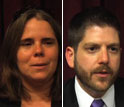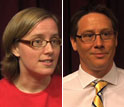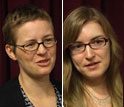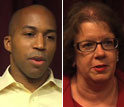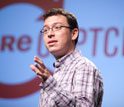News Release 12-140
President Obama Honors Early Career Scientists and Engineers
Awardees, including 20 nominated by NSF, represent science and engineering expertise across a breadth of disciplines and research areas

President Obama addresses 2011 PECASE recipients in the White House, July 31, 2012.
August 3, 2012
View video interviews with 2011 PECASE recipients Mayly Sanchez and Scott Gaudi, Meghan Duffy and David Noone, Alice Pawley and Jennifer Vaughan, and Baratunde Cola and Suzanne Shontz.
This material is available primarily for archival purposes. Telephone numbers or other contact information may be out of date; please see current contact information at media contacts.
President Barack Obama met this week with recipients of the United States government's highest honor for scientists and engineers in the early stages of their independent research careers--the Presidential Early Career Award for Scientists and Engineers (PECASE). Twenty Americans nominated by the National Science Foundation (NSF) are among those who received this award at the White House. Together they represent a rich breadth of research disciplines, which include engineering, geology, biology, economics, physics and computational science.
The PECASE awards represent the high priority the administration places on producing outstanding scientists and engineers to advance the nation's goals and contribute to all sectors of the economy.
"With expertise in fields such as advanced computation, nanotechnology, environmental sciences and neurological engineering, these bright scientists and engineers still early in their careers, embody America's greatest hope for the future," said NSF Director Subra Suresh. "Each will address a pressing issue facing our society; all will advance the health, security and competitiveness of our nation."
The awards, established by President Clinton in February 1996, are coordinated by the Office of Science and Technology Policy within the Executive Office of the President. Award nominees are considered according to two criteria: their pursuit of innovative research at the frontiers of science and technology and their commitment to community service as demonstrated through scientific leadership, public education, or community outreach.
All NSF-nominated awardees for 2011 excel in these areas. All but two are assistant professors. David C. Noone and Luis von Ahn are associate professors in their respective universities. Awardee names, affiliations and official citations are listed below.
- Baratunde A. Cola of the Georgia Institute of Technology "For outstanding research on energy conversion, nanoscale transport and materials, and for significant outreach and educational activities involving K-12 students and teachers from disadvantaged minority communities."
- Brady R. Cox of the University of Texas at Austin (when nominated, at the University of Arkansas) "For outstanding research on the development of probabilistic methods of characterizing engineering properties of near-surface soils, and for international educational activities involving minority undergraduate students."
- Meghan A. Duffy of the University of Michigan (formerly at the Georgia Institute of Technology) "For transformative research on rapid evolutionary responses in novel host-parasite associations, and for providing educational opportunities for college students in underrepresented minority groups and inner-city K-12 students in Atlanta."
- Joshua S. Figueroa of the University of California, San Diego "For innovative use of bulky organic isocyanides to stabilize and isolate transition metal complexes, offering potential applications in alternative energy and sustainable science and technology, and for exemplary teaching, mentoring, outreach activities, and a commitment to increasing the participation of underrepresented minorities in scientific research."
- Michael J. Freedman of Princeton University "For efforts in designing, building, and prototyping a modern, highly scalable, replicated storage cloud system that provides strong robustness guarantees at scale, and for work to increase student diversity at Princeton."
- Erin M. Furtak of the University of Colorado Boulder "For innovative research on how professional development focused on learning progressions increases teacher knowledge and student achievement, and for working with schools and teachers to implement such professional development in diverse settings."
- Bernard S. Gaudi of Ohio State University "For contributing to our understanding of Earth's place in the universe through the study of the demographics of exoplanetary systems, and for reaching out to oft-overlooked, underrepresented groups of children and students in the LGBT and HIV-positive communities."
- Curtis E. Huttenhower of Harvard University "For research on providing a general framework for data mining of thousands of genome databases on multicellular systems made up of multiple species or cell types, and for outreach to high-school students and South African programs."
- Christopher A. Mattson of Brigham Young University "For innovative research to enable product design for sustainable poverty alleviation, and for dedication towards establishing third-world outreach and learning experiences for engineering students."
- David C. Noone of the University of Colorado Boulder "For innovative use of stable isotope tracers and modeling efforts directed towards an integrated understanding of the cycling of water and carbon dioxide through the atmosphere, and for actively engaging students in cutting-edge research at middle schools."
- Parag A. Pathak of the Massachusetts Institute of Technology "For innovative and challenging research in market design, education and housing, and for work with local school administrators throughout the United States that has resulted in more fair and efficient ways to assign children to magnet schools."
- Alice L. Pawley of Purdue University "For outstanding research on root causes of underrepresentation in engineering degree programs, for educational activities and outreach to students and faculty, and for academic leadership to support equality of access to education."
- Amy Lucia Prieto of Colorado State University " For an ambitious research project aimed at understanding and controlling electrodeposition of intermetallic materials for Li-ion battery and energy-storage applications, and for leadership, outreach efforts, and sharing a passion for renewable energy with students at all levels, especially elementary school students from underrepresented groups."
- Mayly Sanchez of Iowa State University "For contributions to the detection and study of neutrinos and their role in some of the most fundamental problems in physics, and for reaching out to potential women STEM majors and exciting them about opportunities in the STEM fields, in particular physics and astronomy."
- Sridevi V. Sarma of John Hopkins University "For a transformative approach to design and control of electrical deep brain stimulation for the treatment of Parkinson's disease, and for innovative educational and outreach activities including mentoring of women in science and engineering."
- Suzanne M, Shontz of Pennsylvania State University "For exemplary research in computational and data-enabled science and engineering that bridges applied mathematics, computer science, and scientific applications, and for contributions to education, including new curricula and approaches that encourage diversity in this emerging field."
- Jennifer Wortman Vaughan of the University of California, Los Angeles "For groundbreaking research unifying machine learning, algorithmic aspects of economics, and social network theory leading to predictive models of preferences and collective behavior, and for increasing the participation of women in computing and providing service to the machine learning and artificial intelligence research communities."
- Mariel Vazquez of San Francisco State University "For excellent interdisciplinary and international research at the interface of mathematics and biology, and for creativity and dedication to recruiting, training, mentoring, and helping students from underrepresented groups achieve their goals."
- Luis von Ahn of Carnegie Mellon University "For innovative research in human computation applied to complex tasks that advance the field of machine translation while simultaneously helping people learn a second language, and for outstanding teaching, mentoring and successful efforts to translate scientific discovery into beneficial commercial products."
- Brent R. Waters of the University of Texas at Austin "For visionary research on novel encryption methods that provide powerful new tools in computer security, an area of national importance, and for service on an election study group, which provided valuable outreach and tangible impact on the community."
-NSF-
-
View Video
Mayly Sanchez and Scott Gaudi work to enhance understanding of the universe.
Credit and Larger Version -
View Video
Meghan Duffy and David Noone work to improve environmental and human health and well being.
Credit and Larger Version -
View Video
Alice Pawley and Jennifer Vaughan work for inclusion of more women in their fields of engineering.
Credit and Larger Version -
View Video
Baratunde Cola and Suzanne Shontz work on efficient and competitive product design and application.
Credit and Larger Version -
Luis von Ahn, an entrepreneur in computer science, is shown teaching a class at Carnegie Mellon.
Credit and Larger Version
Media Contacts
Lisa-Joy Zgorski, NSF, (703) 292-8311, email: lisajoy@nsf.gov
Program Contacts
Mayra N. Montrose, NSF, (703) 292-4757, email: mmontros@nsf.gov
Related Websites
President Obama Honors Outstanding Early-Career Scientists: http://www.whitehouse.gov/the-press-office/2012/07/23/president-obama-honors-outstanding-early-career-scientists
Presidential Early Career Award for Scientists and Engineers (PECASE) Winners: http://www.youtube.com/watch?v=40MfN6lvhDc
Directorate for Computer & Information Science and Engineering: http://www.nsf.gov/dir/index.jsp?org=cise
The U.S. National Science Foundation propels the nation forward by advancing fundamental research in all fields of science and engineering. NSF supports research and people by providing facilities, instruments and funding to support their ingenuity and sustain the U.S. as a global leader in research and innovation. With a fiscal year 2023 budget of $9.5 billion, NSF funds reach all 50 states through grants to nearly 2,000 colleges, universities and institutions. Each year, NSF receives more than 40,000 competitive proposals and makes about 11,000 new awards. Those awards include support for cooperative research with industry, Arctic and Antarctic research and operations, and U.S. participation in international scientific efforts.
Connect with us online
NSF website: nsf.gov
NSF News: nsf.gov/news
For News Media: nsf.gov/news/newsroom
Statistics: nsf.gov/statistics/
Awards database: nsf.gov/awardsearch/
Follow us on social
Twitter: twitter.com/NSF
Facebook: facebook.com/US.NSF
Instagram: instagram.com/nsfgov



